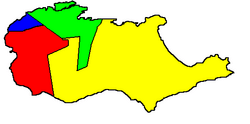Île Perrot facts for kids
Quick facts for kids
Île Perrot
|
|
|---|---|
|
Island
|
|

Île Perrot, showing its municipalities:
Green: Ville de l'Île-Perrot Yellow: Notre-Dame-de-l'Île-Perrot Red: Pincourt Blue: Terrasse-Vaudreuil |
|
| Country | Canada |
| Province | Quebec |
| Region | Montérégie |
| RCM | Vaudreuil-Soulanges |
| Area | |
| • Land | 41.94 km2 (16.19 sq mi) |
| Population
(2016)
|
|
| • Total | 37,954 |
| • Density | 904.9/km2 (2,344/sq mi) |
| Time zone | UTC-5 (Eastern (EST)) |
| • Summer (DST) | UTC-4 (EDT) |
| Postal code span |
J7W
J7V |
| Area code(s) | (514) and (438) |
Île Perrot is an island located west of the island of Montreal in the Canadian province of Quebec. It is part of a group of islands called the Hochelaga Archipelago. This island sits between two lakes: Lake Saint-Louis and Lac des Deux-Montagnes.
The island was first given to François-Marie Perrot on October 28, 1672. He was the Governor of Montreal at the time, and the land was granted by Intendant Talon of New France.
Today, almost 38,000 people live on Île Perrot. They live in one of the island's four main towns:
- Notre-Dame-de-l'Île-Perrot
- Pincourt
- Terrasse Vaudreuil
- L'Île-Perrot
Île Perrot is home to Quebec's only working windmill. This windmill dates back to when Île Perrot was a "seigneury" (a type of land grant) in the French colony of New France. The windmill and the miller's house next to it were recognized as a National Historic Site of Canada in 1969. Later, in 1977, they became a Historic Monument under provincial heritage laws. A main road on the island, boulevard Don-Quichotte, was named in honor of the windmill.
Island Geology and Soils
The ground beneath Île Perrot is made of a hard rock called quartzite, which formed during the Cambrian period. You can see pieces of this strong rock on the surface across much of the island. The soil here is a stony, sandy podzol. It developed from acidic, nutrient-poor quartzite till (rock fragments left by glaciers).
In some areas of the island, this till is covered by clay. This clay soil has more nutrients and fewer stones, but it doesn't drain water very well. This type of soil is known as gleysol.
Island Vegetation and Forests
Even with new homes being built, a good part of Île Perrot is still covered in forest. These forests are mostly made up of Deciduous trees, which lose their leaves in the fall. Some common trees you'll find include the American beech, sugar maple, red maple, northern red oak, white ash, bitternut hickory, and American basswood.
Even though the soil can be challenging, the plants here grow very well. The island has a wide variety of beautiful wildflowers.
See also
 In Spanish: Isla Perrot para niños
In Spanish: Isla Perrot para niños

